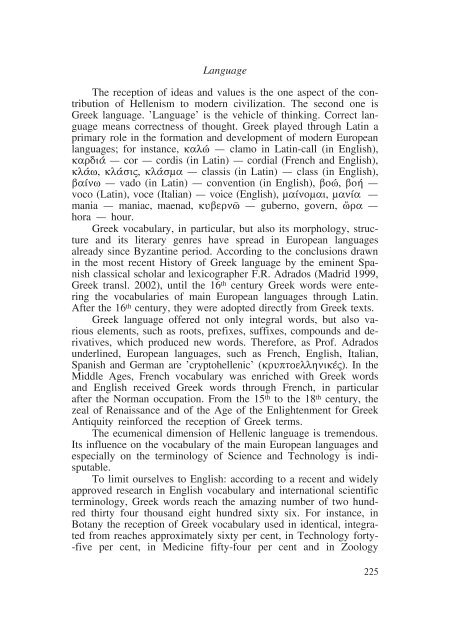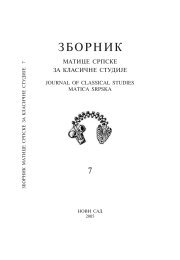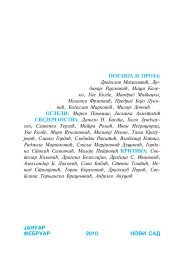Create successful ePaper yourself
Turn your PDF publications into a flip-book with our unique Google optimized e-Paper software.
Language<br />
The reception of ideas and values is the one aspect of the contribution<br />
of Hellenism to modern civilization. The second one is<br />
Greek language. 'Language' is the vehicle of thinking. Correct language<br />
means correctness of thought. Greek played through Latin a<br />
primary role in the formation and development of modern European<br />
languages; for instance, kal3 — clamo in Latin-call (in English),<br />
kardiÀ — cor — cordis (in Latin) — cordial (French and English),<br />
klÀw, klÀsij, klÀsma — classis (in Latin) — class (in English),<br />
baånw — vado (in Latin) — convention (in English), bo3, bo0 —<br />
voco (Latin), voce (Italian) — voice (English), maånomai, manåa —<br />
mania — maniac, maenad, kybern% — guberno, govern, ýra —<br />
hora — hour.<br />
Greek vocabulary, in particular, but also its morphology, structure<br />
and its literary genres have spread in European languages<br />
already since Byzantine period. According to the conclusions drawn<br />
in the most recent History of Greek language by the eminent Spanish<br />
classical scholar and lexicographer F.R. Adrados (Madrid 1999,<br />
Greek transl. 2002), until the 16 th century Greek words were entering<br />
the vocabularies of main European languages through Latin.<br />
After the 16 th century, they were adopted directly from Greek texts.<br />
Greek language offered not only integral words, but also various<br />
elements, such as roots, prefixes, suffixes, compounds and derivatives,<br />
which produced new words. Therefore, as Prof. Adrados<br />
underlined, European languages, such as French, English, Italian,<br />
Spanish and German are 'cryptohellenic' (kryptoellhnikçj). In the<br />
Middle Ages, French vocabulary was enriched with Greek words<br />
and English received Greek words through French, in particular<br />
after the Norman occupation. From the 15 th to the 18 th century, the<br />
zeal of Renaissance and of the Age of the Enlightenment for Greek<br />
Antiquity reinforced the reception of Greek terms.<br />
The ecumenical dimension of Hellenic language is tremendous.<br />
Its influence on the vocabulary of the main European languages and<br />
especially on the terminology of Science and Technology is indisputable.<br />
To limit ourselves to English: according to a recent and widely<br />
approved research in English vocabulary and international scientific<br />
terminology, Greek words reach the amazing number of two hundred<br />
thirty four thousand eight hundred sixty six. For instance, in<br />
Botany the reception of Greek vocabulary used in identical, integrated<br />
from reaches approximately sixty per cent, in Technology forty-<br />
-five per cent, in Medicine fifty-four per cent and in Zoology<br />
225

















